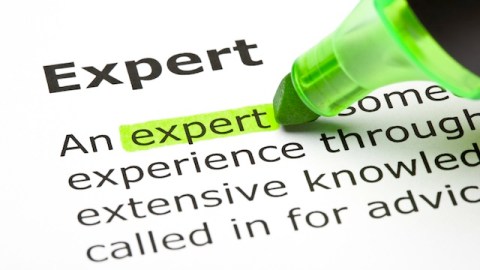Why the Experts Get Everything Wrong

Being an expert means never having to say you’re sorry. If it turns out you’re wrong about something—about, say, whether Iraq had weapons of mass destruction or whether there was a housing bubble—that’s okay. As an expert you must have had good reasons for being wrong. Anyone who got right what you got wrong must have simply gotten lucky.
That’s what most of our experts say, anyway. Sometimes, of course, it is reasonable, on the basis of what we know, to draw the wrong conclusion. But in a recent essay, Thomas Frank decries our reluctance to hold our so-called “experts” responsible for their mistakes. Franks points out that we continue treat people like Bill Kristol and Thomas Friedman who were wrong about Iraq—and who were wrong again and again—as experts on Middle Eastern policy. And economists like Ben Bernanke and Larry Summers who failed to see the economic crisis coming are the same economists we entrusted to fix the economy.
Each separate catastrophe should have been followed by a wave of apologies and resignations; taken together—and given that a good percentage of the pundit corps signed on to two or even three of these idiotic storylines—they mandated mass firings in the newsrooms and op-ed pages of the nations. Quicker than you could say “Ahmed Chalabi,” an entire generation of newsroom fools should have lost their jobs.
But that’s not what happened. The supposed experts who were wrong on numerous important counts still occupy the same important positions. Meanwhile the people who were derided as cranks for arguing that Iraq had no weapons of mass destruction or that there was a housing bubble—even though they gave compelling reasons for doing so—are still dismissed as cranks.
Frank is right. If you want to to be considered an expert in something, you don’t have to demonstrate real expertise. What you have to do is show you fit in and get along. That’s why it’s not surprising our experts get things wrong. By and large the people who run our government and who shape our opinions are the popular kids, not the ones who ace the real world’s tests. Nouriel Roubini—one of the economists who saw the financial crisis coming—gets a few more speaking engagements than before the crisis, but he isn’t taken much more seriously. As Frank says, there is no real social value in being right about the important things.
The people who do get taken seriously are the ones who tell us what we want to hear. In practice that generally means what people with money want to hear. It doesn’t really matter whether our experts actually believe what they’re saying, if they’ve been cherry-picked to say it. They are enablers more than they are real experts. The whole institutional structure of expertise—the news organizations, the think tanks, and the research institutions that give experts credibility—largely serves the interests of the people and corporations who fund it. So it should not be surprising that we have experts who say that bankers were blameless in the economic crisis, that coal is clean, or that the military budget needs to be bigger. It is ultimately up to us to be better, more skeptical consumers of expert analysis. Especially where there’s money at stake.
Expert image from Ivelin Radkov/Shutterstock





